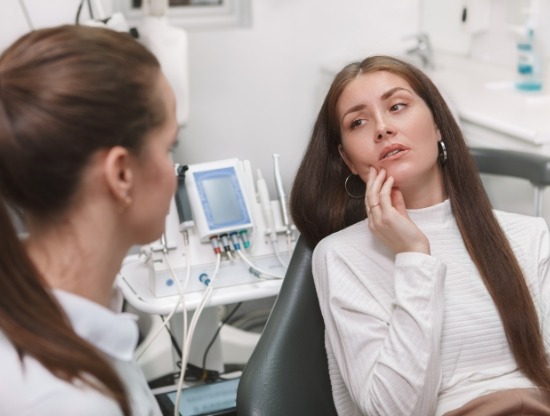Emergency Dentist Rocky Hill
Helping Current Patients Get Out of Pain

There’s no telling what kind of challenges life will bring you sometimes. Dental emergencies like toothaches, lost crowns, and broken teeth can happen at any time. If you find yourself in one of these situations, don’t hesitate to call our dental office right away. Dr. Karpman will do everything she can to see you as soon as possible to evaluate your problem and find a solution for stopping your pain and restoring your teeth. You can trust her to be here when you need her most, offering emergency dentistry in Rocky Hill, CT!
Why Choose Dental Essentials of Rocky Hill for Emergency Dental Care?
- Down-to-Earth, Patient-Focused Dentist
- Wide Array of Restorative Treatments
- Your Dental Insurance Benefits Maximized
I Need a Checkup & Cleaning I am Concerned About Bleeding Gums I Have a Cavity or Broken Tooth I am Missing One or More Teeth I Want to Enhance My Smile I Want a Straighter Smile I Have Jaw Pain View Our Services
How We Treat Dental Emergencies

- Scheduling an appointment: Getting in touch with your dentist should always be your first move once you realize you’re suffering from a potential emergency. As a current patient, we’ll strive to see you as soon as possible. We can help you take control of the situation by offering some simple first-aid tips over the phone while you wait at home.
- Emergency exam: As soon as you arrive, a team member will bring you to one of our operatories so that a dentist can meet with you and perform an emergency exam. If needed, we may also capture digital X-rays in case the cause and location of your symptoms cannot be easily identified.
- Reviewing our findings: Once we have helped you stabilize and gotten you out of pain, our team will provide a recommended treatment plan to handle your emergency, prevent symptoms from coming back, and get your oral health back to normal. We will always break down your estimated costs and expected timeline so you’re never taken by surprise and can make an informed decision about your care.
- Giving you the care you need: The most common treatments we recommend for dental emergencies include dental fillings, crowns, root canal therapy, and extractions, but other services may be suggested, if appropriate.
The Most Common Dental Emergencies
Dental emergencies come in many forms, all of which have varying symptoms that can be alarming. Knowing is half the battle in any dental emergency, which is why it’s always a good idea to educate yourself on what constitutes one ahead of time. From there, you can call our office, get scheduled, protect your teeth from further damage, and ease any pain you might be experiencing related to these common oral health issues.
Understanding the Cost of Dental Emergencies

Sometimes, treating your emergency will be simpler than you’d expect. In other cases, though, you might need root canal therapy or another complex procedure. Naturally, the cost of care will be affected by the severity of your case and the kind of treatment you need to undergo. Remember: by having emergencies treated as quickly as possible, you can avoid further complications and thus will save money on additional care.
Why Dental Emergencies are Unique (and Affect Your Cost)
Emergency dental visits are not as expensive as you’d think. When you arrive, you’ll be examined by Dr. Karpman so a treatment plan can be developed. The goal is to get you out of pain as soon as we can, but we won’t be able to do that until we confirm what is specifically causing your dental issue. While every dental emergency has its own unique factors that will determine your final cost, it will mainly depend on the treatment that will best help your situation. For example, we usually perform the following treatments to resolve dental emergencies:
- Root canal therapy
- Dental crowns
- Extractions
- TMJ/TMD therapy
- And more!
Does Dental Insurance Cover Dental Emergencies?
While dental insurance primarily covers preventive care, insurance providers understand that accidents happen, which is why most plans cover one emergency exam a year. The degree to which they’ll cover your treatment, however, varies based on the type of emergency you’re experiencing. Most restorative treatments are covered from 50 to 80 percent once you’ve met your deductible. Our team is more than happy to examine your policy and maximize the benefits you have available.
Other Options for Making Dental Emergencies Affordable
Even if you don’t have dental insurance to use for your emergency treatment, there are other options available to you. This includes CareCredit, a service that makes it possible to pay for dental treatment over the span of several months. When you qualify, you can even expect to pay little to no-interest on your payments, making it easy to accommodate emergency dental treatment into your budget.
Regardless of the situation you find yourself in, Dental Essentials of Rocky Hill is more than happy to help you navigate costs and get the best value possible, so feel free to reach out at any time for guidance!
How Staying Proactive Can Help You Save
Not all dental emergencies are avoidable, such as bad falls or sporting injuries. The good news is most of them are preventable when you take a few key steps in mind. This includes scheduling routine dental exams and cleanings as well as sticking to a strict and consistent at-home oral care routine. These steps alone do wonders for your long-term oral health because they help you prevent plaque buildup, cavity production, gum disease, and dental infections.
Additionally, you should always get in touch with our office as soon as you notice something is not quite right. This could include tooth pain, sensitive gums, loose teeth, oral bleeding, facial swelling, or any other issues related to your mouth. Putting off emergency care when you need it most is only going to increase the risks of your dental issue getting worse. If you want to reduce the number of treatments needed to protect your oral health, you don’t want to take the risk and assume your dental problem will go away on its own.
How to Prevent Dental Emergencies

Unfortunately, as we might, the risk of a dental infection or injury will never be zero. However, there are plenty of healthy habits and simple precautions that go a long way in minimizing your risk of encountering a dental emergency! Read on as we cover the five most important things you should be doing to avoid a dental emergency in Rocky Hill.
Visit Your Dentist Regularly
The American Dental Association recommends getting a dental checkup and cleaning every six months, and we heartily agree! These routine visits allow us to monitor your oral health and spot any small issues as early as possible, long before they pop up suddenly as a dental emergency. Plus, with thorough cleaning and personalized preventive care twice a year, we aim to keep these problems from developing in the first place!
Maintain Good Oral Hygiene Habits at Home
Between your dental checkups and cleanings, you need to keep your teeth and gums strong and healthy with excellent oral hygiene. Cavities and gingivitis are more than annoying: these simple nuisances can grow into serious oral health issues that need immediate care. Thankfully, you can keep your oral health on track by:
- Brushing for two minutes twice a day
- Flossing every day
- Rinsing with mouthwash regularly
Be Careful With Your Diet
You already know that eating too many sweets can give you a cavity. But did you know that untreated cavities can lead to dental infections and abscesses? What’s more, that same cavity-causing bacteria can attack your gums and cause a serious condition known as gum disease! Keeping sugary snacks to a minimum will be good for both your smile and your waistline. Instead, eat more foods with calcium and vitamin C, which are important nutrients that will keep your smile strong and sparkling.
Wear a Mouthguard
Are you active or play sports? Then you need a mouthguard! These simple little appliances can make all the difference when it comes to preventing broken or knocked-out teeth, and some studies suggest they can lower your risk of a concussion as well.
You may need a mouthguard while you sleep as well if you grind your teeth at night. This condition is called bruxism, and it exerts excessive wear and tear on your teeth. Aside from causing routine headaches and jaw pain, you may suddenly find yourself with a chipped or fractured tooth because of bruxism! Thankfully, a custom nightguard can give your smile the protection it needs while you sleep.
Use Tools, Not Teeth to Open Packaging
When you’re feeling lazy, rushed, or excited, it’s easy to think that using your teeth to open a package or container will save time. Though it may seem convenient at the moment, using your teeth as tools to open bags, bottles, mail, and packaging of any other sort can cause a dental emergency in the blink of an eye! Instead of putting your smile at risk, consider keeping tools like scissors somewhere easy and convenient to reach.
Dental Emergency FAQs
Will my toothache go away on its own?
Toothaches do not typically go away on their own. Because of this, it is best to schedule a checkup with a dentist to ensure that nothing serious is going on. There are many potential causes for toothache, so you’ll want to rule them out with a professional as soon as you can. By catching issues now, you can prevent them from becoming more severe in the future.
How should I sleep with tooth pain?
When you have a toothache at night, it can be frustrating to get quality sleep. Until you can see your emergency dentist, keep your head elevated. This prevents blood from rushing to your head and intensifying your toothache. Try taking over-the-counter pain relievers as directed and avoiding foods that are particularly acidic, cold, or hard before bed. Using a cold compress can also help to numb your discomfort.
Should I visit the emergency room first for dental emergencies?
Most emergency rooms are unable to address dental emergencies effectively, but there are a few exceptions. You should head to the emergency room if you have a jaw fracture or dislocation, a serious cut or laceration to the face, or an abscess or infection that has become swollen to the point of affecting breathing or swallowing. In virtually any other circumstances, you should visit a dentist for treatment instead. If you are suffering from a dental emergency, we will always do our best to see you on the same day.
Is my tooth pain from an infection?
If you have a toothache, there is a chance that you could have an infection. The only way to know for sure is to see a dentist who can capture X-rays and provide a detailed diagnosis, but here are some of the common signs of an infected tooth:
- A tooth that feels sore
- A throbbing toothache
- Bitter taste in the mouth
- Tooth sensitivity
- Chronic bad breath
- Red or swollen gums
- Loosening of the teeth
